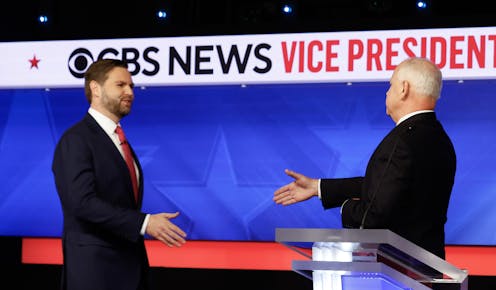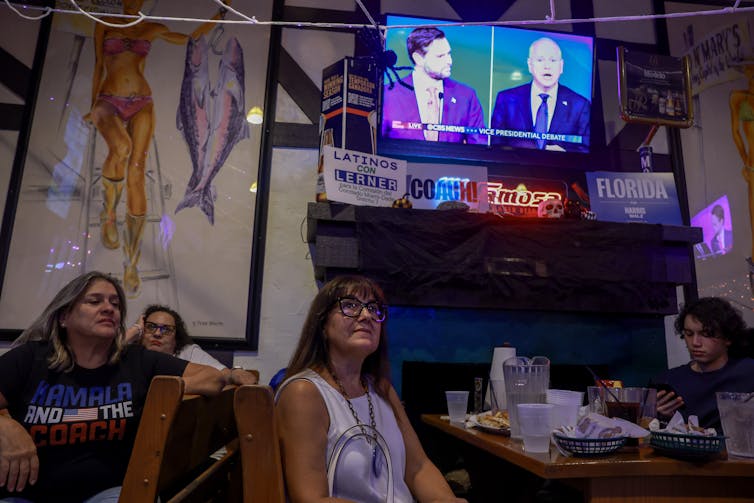America’s dad vs. the manosphere: Walz-Vance debate highlights two versions of masculinity
Masculinity has become a dominant theme in the race for the White House. In their debate, VP candidates JD Vance and Tim Walz showed just how much they differ on what that means.

Few people expected the campaign to elect the first woman president to spark a referendum on masculinity, but what it means to be a man has become “arguably the most dominant theme of this year’s elections,” according to MSNBC’s Ja'han Jones.
The debate between vice presidential nominees Democrat Tim Walz and Republican JD Vance on Oct. 1, 2024, showcased two candidates who not only had contrasting debate styles but also competing views of women’s and men’s autonomy.
As a political communication scholar, I have written about how gender shaped the dynamics of presidential and vice-presidential debates featuring opponents of different genders. The 2024 Walz-Vance debate illustrated how gender can become a focal point in a debate between two men.
Trust was an important theme throughout the debate, one that – perhaps surprisingly – revealed a key distinction between Walz, Vance and their respective political parties.
During an extended discussion about abortion rights, Vance reinforced his running mate Donald Trump’s assertion that women’s reproductive health care decisions should be made by state legislatures. Vance then introduced a new argument, suggesting that what the GOP should focus on is earning women’s trust by proving that the party can somehow make it more palatable for women to … not have an abortion.
Later in the debate, Vance stated that he supports “a family care model that makes choice possible,” but the range of choices referred to child care options, not choices about whether to have children.
Walz, conversely, urged that women should be free and trusted to make their own reproductive and child care decisions.
Throughout the debate, Vance subtly suggested that authority and autonomy are the purview of men, reinforcing how patriarchy is shaping the Republican strategy.

Masculinity on the campaign trail
Both the Republican and Democratic parties have featured masculinity prominently in their campaigns for the White House.
Although Vance and Walz have each presented themselves as typical “Midwestern guys,” they differ on what that means.
Walz has embraced the moniker of “America’s dad” in ways that are both recognizable and revolutionary.
Esquire reported that he inspired “social media posts by the thousands” that “imagined Walz doing nice, midwestern-dad-like things.”
Using the “BigDadEnergy” hashtag, Walz supporters imagined, “Tim Walz will take your little league team to Dairy Queen even after you lose a game, because doggonit, you played your best” and “Tim Walz brushed the snow off of your car too, since you were parked next to him and he already had the darn brush out.”
But he also expanded that stereotype by ceding his status as patriarch to become Kamala Harris’s dutiful running mate and proving that pheasant-hunting football coaches can also advocate for gay and trans kids.
Vance featured his dad credentials in his speech at the 2024 Republican National Convention, but his status as a prominent member of the “manosphere” – an unofficial network of reactionary men’s groups promoting the supremacy of patriarchy – has given his masculine persona a hard and sometimes extreme edge.
Independent political groups have also made masculinity one of the presidential campaign’s central concerns. The Lincoln Project – an organization comprised of current and former Republicans opposed to Donald Trump – recently released a campaign ad aimed at moderate swing voters that featured the iconography of the American heartland made famous by President Ronald Reagan’s 1984 “Morning in America” re-election campaign ad.
The ad is voiced by actor Sam Elliott, a frequent silver-screen cowboy with a deep bass drawl, who asks voters, “So, what the hell are you waiting for? Because if it’s the woman thing, it’s time to get over that. … It’s time to be a man and vote for a woman.”
The group “White Dudes for Harris” took a different approach to the same pitch, putting out an ad with a brash male narrator who observes that men are “pretty sick of hearing how much we suck,” but contends that “Trump and all his MAGA buddies are out there making it worse, shouting nonsense in their stupid red hats and acting like they speak for us when they don’t.”
The narrator then says that Harris and Walz “are actually talking to guys like us” and offering “real solutions that protect our freedoms and help us take care of the people who matter.” The ad concludes: At the “end of the day, you’re your own man. It’s your call. But if anyone gives you crap about it, tell them it’s none of their damn business,” echoing one of Walz’s most popular applause lines.
The debate put Walz’s and Vance’s competing views of masculinity in direct competition as they made their pitches to swing voters.
Deference and doubling down during the debate
Before the debate, Washington Post politics reporter Ashley Parker wondered whether Walz’s “flannel-wearing, gutter-clearing, football-coaching Everyman shtick” might play better in front of a “friendly rally crowd” than it would “while facing an attack dog opponent.”
Vance, conversely, has embraced the vice-presidential nominee’s traditional role of “attack dog.” He campaigns by “borrowing his boss’s playbook of openly sparring with the media and rarely, if ever, apologizing for what he says,” as Vivian Salama of The Wall Street Journal reports.
But Vance took a different tack during the debate, making confident but cordial assertions while magnanimously agreeing that he and Walz shared good intentions for the American people.
He was less magnanimous when speaking to or about women.
Twenty-eight minutes into the debate, Vance’s mic was turned off after he mansplained immigration law to moderator Margaret Brennan.
Brennan, importantly, was correcting Vance’s claim that illegal immigration was harming the citizens of Springfield, Ohio, noting that the influx of Haitian migrants to Springfield was a product of legal immigration.
After Vance continued to speak beyond his allotted time, producers turned off his mic. Tellingly, Vance violated the rules of the debate when a woman moderator corrected him.
Vance also indicated, repeatedly, that Walz could be trusted but Kamala Harris could not.
It is, of course, not unusual for a vice-presidential candidate to attack the opposing ticket. Traditionally, that’s a vice-presidential candidate’s first priority in the VP debate.
But Vance took particular care to defer to his white, male counterpart and insist that the Black woman leading the Democratic ticket was the real problem.
For example, when responding to a question about housing prices, Walz argued that immigrants should not be blamed for the rising costs of housing, responding to a claim that Vance made about housing in Springfield, Ohio.
Rather than objecting to Walz’s fact check – as he had Brennan’s earlier in the debate – Vance said, “Tim just said something that I agree with. We don’t want to blame immigrants for higher housing prices, but we do want to blame Kamala Harris for letting in millions of illegal aliens into this country, which does drive up costs, Tim.”
Vance was careful to defer to his white male opponent while doubling down on criticism of immigrants and the Black woman running for president.
It’s a subtle strategy, but one that could be potentially effective with swing voters who have responded positively to Walz’s “Big Dad Energy” but who, consciously or unconsciously, are inclined to be skeptical about voting for a Black woman candidate.
Karrin Vasby Anderson does not work for, consult, own shares in or receive funding from any company or organization that would benefit from this article, and has disclosed no relevant affiliations beyond their academic appointment.
Read These Next
Violent aftermath of Mexico’s ‘El Mencho’ killing follows pattern of other high-profile cartel hits
Members of the Jalisco New Generation Cartel have set up roadblocks and attacked property and security…
Crowdfunded generosity isn’t taxable – but IRS regulations haven’t kept up with the growth of mutual
Some Americans are discovering that monetary help they received from friends, neighbors or even strangers…
Algorithms that customize marketing to your phone could also influence your views on warfare
AI systems are getting good at optimizing persuasion in commerce. They are also quietly becoming tools…





